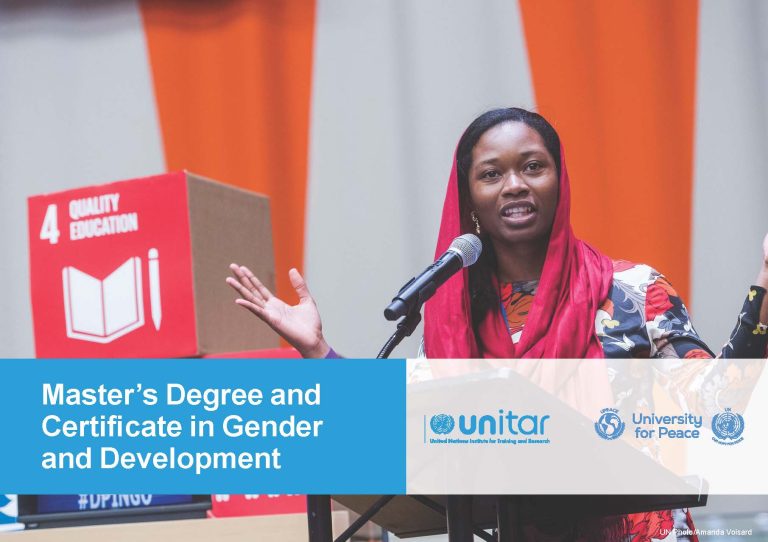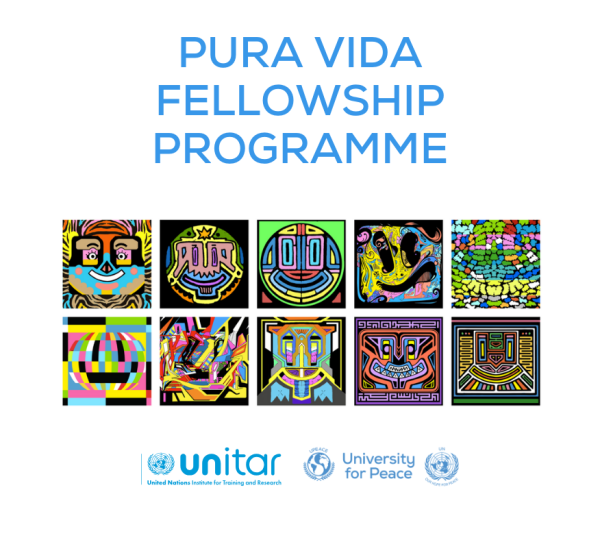Certificate in Gender and Development (UPEACE-UNITAR)
Format: Hybrid
Programme Start Date: 28 August 2024
Application Deadline: 31 May 2024
Programme Overview
The HYBRID Certificate in Gender and Development, offered jointly by UPEACE and the United Nations Institute for Training and Research (UNITAR), aims to equip participants with the critical perspectives necessary for nurturing gender consciousness in development. Gain the skills to advance gender equality with this certificate programme focused on the crucial role of women in diplomacy and development.
The programme is offered in Hybrid Format (online + face-to-face on the UPEACE campus in San José, Costa Rica). Students in this programme will develop the skills required for a successful international career in a variety of fields – diplomacy, development, politics, social work, human resources, human rights, teaching, research, policy institutes/think tanks, and others. Participants will have the opportunity to complete the program within a six-month period, between September and March.
Students will also attend skills development sessions that are designed to support their professional careers and employability. Careers in this field can be very broad. Prospective employers include governments, International and regional organizations, think tanks, academia, human rights organizations, and civil society.
Students will have an opportunity to participate in an optional field visit to Geneva (Switzerland) and The Hague (Netherlands), immersing themselves in the heart of diplomacy and international law.
Programme Modules
The HYBRID Certificate in Gender and Development will be implemented both face-to-face in San José, Costa Rica on UPEACE’s campus, and online through UPEACE’s Virtual Learning Environment.
Students can obtain the Certificate in Gender and Development upon the successful completion of 12 credits. The list of courses to be added to the certification can be chosen by the student from the existing courses of the M.A. in Gender and Development (see brochure above). The list must be approved by the programme coordinator to ensure it includes courses relevant to Gender and Development.
Field Visits
Students admitted to the programme are offered a unique opportunity to partake in an optional field visit to Geneva, Switzerland, and/or The Hague, Netherlands, immersing themselves in the heart of diplomacy and international law.
The five-day field trip(s) cost USD 1,500 each and include exclusive experiences such as visiting various international organizations, the ICRC museum in Geneva, the ICJ in The Hague, and engaging in networking sessions with diplomats, personnel from permanent missions accredited to the UN, civil servants working in international organizations, and representatives from civil society.
Scheduled for the summer, the confirmed dates for these optional field visits will be shared with interested students by UPEACE and UNITAR well in advance. Students have the flexibility to enrol in either the Geneva or The Hague visit individually, or they can choose to participate in both field trips to maximize their learning experience.
(*) Please note that the fellowship programme does not include travel, accommodation, food, or visa expenses. Students will be registered to the Costa Rican national healthcare system by the University for Peace upon their arrival in Costa Rica.
Eligibility
- Undergraduate degree or equivalent in relevant discipline
- English proficiency
- Excellent academic performance
Admissions Requirements
- English Proficiency Test Scores Report
- Statement of Purpose
- Curriculum Vitae or Resume
- Letters of Recommendation
- Official Undergraduate (Bachelor’s) Degree
- Undergraduate Degree Certificate of Graduation
- Transcripts of Records
- Copy of Passport
- Passport-size photo for ID purposes
Costs
The cost for pursuing the Certificate in Gender and Development is USD 5,700. This includes tuition, administrative fees, and other associated costs. It is important to note that additional expenses, such as field visits, may not be covered in this figure.
Pura Vida Fellowships
In 2023, the University for Peace (UPEACE) and the United Nations Institute for Training and Research (UNITAR) collaborated on the “Art for Peace” NFT collection, featuring Costa Rican artist Gussa’s digital artwork under the title “Pura Vida.”
This initiative gave rise to the “Pura Vida” Fellowship Programme, offering fellowships for UPEACE-UNITAR joint Master’s and Certificate Programmes, as well as Field Visits to Geneva and The Hague. The fellowships aim to enhance inclusion, by empowering nationals from Least Developed Countries (LDCs) and Small Island Developing States (SIDS).
Eligibility: To be considered for the Pura Vida Fellowship, applicants must be nationals from the LDCs or SIDS included on the official UN lists:
Selection Process
UPEACE and UNITAR will consider academic background, professional experience, and the relevance of the applicant’s degree to the chosen programme in the selection process for the Pura Vida Fellowships.
Application Process
Prospective Fellows are encouraged to apply and can seek further information by emailing admissions@upeace.org or click the image below.
Become a Pura Vida Fellow; click the image below for more information.



